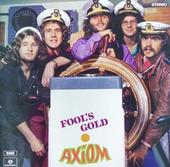Axiom was formed by Brian Cadd and Don Mudie, both former members of leading Melbourne popsters The Groop. Cadd, who began his career with Melbourne’s The Jackson Kings, was already a prominent singer, songwriter and keyboard player. Besides his success with The Groop, he wrote hits for other acts, including Elevator Driver for the Master's Apprentices and When I Was Only Six Years Old for Ronnie Burns (also a UK hit for Paul Jones) and both he and Mudie worked as session players on a number of important recordings including the Russell Morris' classics The Real Thing and Part III into Paper Walls. After linking up in The Groop, Mudie and Cadd formed a successful songwriting partnership that carried on through Axiom and beyond. Shorrock was the former lead singer of The Twilights; Lavery was from Perth's (in)famous The Valentines; Stockley was from leading Melbourne group Cam-Pact.
The formation of Axiom was apparently rather controversial, and there have been suggestions (probably based on reports in Go-Set) that Cadd & Mudie had deliberately engineered the break-up of The Groop in order to be able to form Axiom. The offer was evidently an attactive one -- Lavery and Stockley quit their respective bands and Shorrock withdrew from managing Melbourne band The Avengers to join. The Groop split after Mudie and Cadd had conducted lengthy (and apparently secret) negotiations to recruit Terry Britten who, like Shorrock had been a member of the recently defunct Twilights. They were unsuccessful in snaring Britten, but this evidently enabled them to make the link that resulted in the recruitment of Shorrock.
Axiom signed to Ron Tudor’s Fable Records. Their first single Arkansas Grass (co-written by Cadd and Mudie) reached #7 in Dec. 1969. Cadd, like many other Aussie musicians, had been deeply influenced by the trend towards a fusion of country and folk elements with rock, spearheaded by acts like Dylan, The Byrds, Crosby Stills & Nash and especially The Band, Songs like Arkansas Grass show how well and how quickly Axiom mastered the idiom, and proved that they were able to create material that could stand up against (or indeed pass for) that of any major American group.
Doug Lavery left the band in early 1970 to join The Mixtures and was replaced by Don Lebler (ex-Avengers). Axiom left for London in April with publishing deal from Leeds Music and (reportedly) with record deals on offer from both Apple and Decca. Their attempts to break into the English scene were understandable in the context of the time, but in retrospect their material clearly suggests that they would have been much more likely to succeed in America (as LRB would ultimately prove). Indeed, the latter part of their career suggest that they were heading in that direction, as so often happened, it seems that they lacked the necessary management and record company support.
They released their second single Little Ray of Sunshine (written about Cadd's newborn daughter) just prior to leaving for England. It immediately shot to #5 in April 1970 and has since become a standard. The single was followed by their excellent debut LP Fools Gold, which reached #18 in June, and it still stands as one of the best albums of the period, although it is sadly long out of print. Their first two singles are considered classics, and the latter, a perennial favourite, has become one of Glenn Shorrock's trademark songs, and was even celebrated with its own stamp in Australia Post's 1998 Australian Rock stamp series. Another notable song is the album’s closer, Who Am I Gonna See. We believe it is the first Australian pop/rock record to use a didgeridoo in the arrangement. (Copyright © Milesago 2000)
